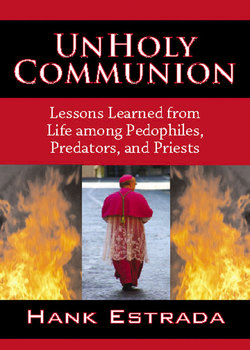Читать книгу UnHoly Communion-Lessons Learned from Life among Pedophiles, Predators, and Priests - Hank Ph.D. Estrada - Страница 8
На сайте Литреса книга снята с продажи.
Catholic Priesthood
ОглавлениеWhile living in a religious community of Catholic priests and brothers, I quickly learned about the many personal benefits a religious clergyman receives throughout his priesthood, among them prestige, privilege, protection, and often unchallenged influential power over parishioners. Could these questionable benefits lead to arrogance, self-righteousness, and a false sense of invincibility on the part of the priest? What about a sense of accountability, respect, adherence to faith, protection of the innocent, and being true examples of Christ’s presence in the world? I witnessed as these men who wore a traditional black suit with white “Roman” collar, undeniably the most recognizable symbol of the Catholic priesthood, were frequently sought out, pampered, given unlimited trust and attention, and had people constantly offering to do things for them. Internally, I questioned some priests I saw take the spiritual “gift” of priesthood and turn it into something they bartered with, a way to control parishioners, as though saying “If you treat me special, I will pray and give you blessings from our Lord.”
Whenever a “Father” offered, well-meaning parents would allow their young sons to sleep over at the rectory or go on overnight outings with priests. Parents would show visible pride knowing their boy was selected from all others and would boast to fellow family and friends about the special attention “Father” bestowed on their sons, not realizing the horrific sexual assaults many would endure. Fortunately, in the United States, families have now learned not to simply hand over their child to clergymen who express special interest in their child. Unfortunately, however, in numerous foreign countries still today, predator priests and clergy have unlimited access to numerous trusting parents.
Nearly every material need was provided for every priest and seminarian: meals, gas, insurance, medical care, cars, travel expenses, even housing. Priests and religious clergy are the objects of unending attention and attraction by the faithful—and they know it. Even as a seminarian, when I dressed in full black priestly garb with white collar, I noticed and experienced parishioners vying for the opportunity to get physically close to me with ostentatious hugs, overly friendly innuendos, and by initiating private and exclusive one-on-one conversations. There was no way to ignore this typical reaction from people each time they saw me wearing the traditional Roman collar. It remains a tempting fact for all religious persons who wear distinctive clergy-affiliated garb. No doubt many parishioners still react this way when a priest enters a room wearing his collar.
I vividly remember being taught as child to look up to the local priest and sternly urged to offer him complete respect and reverence whenever our paths crossed. Never in my entire young life was there any discussion about being careful or cautious around a priest. A priest could do no wrong. I was proud knowing I was on my own personal journey to becoming an honorable priest. I truly felt without regrets that I was now called to a religious vocation and fortunate enough to be among this friendly community of ordained priests and religious brothers.
Roman Collar
As seminarians, we were expected to attend public colleges and select training programs that most interested us academically and socially. The wearing of the Roman collar was prohibited to only times when ministry service was being performed around the parish and in hospitals and jail settings. We taught religious education classes, studied liturgy and homily sermon preparation, visited the sick and elderly, and led rosary recitals during wakes and funeral prayer services. Some of us also sang in choirs and those with musical talents performed with local parish music groups.
The most rewarding choice I made for my ministerial training was to work among persons who were deaf and hearing impaired. I was fortunate enough to be involved with one of the largest Catholic hearing-impaired communities in the Los Angeles Archdiocese and apprenticed under a remarkable hearing-impaired priest, Father Brian Doran. With Father Doran’s guidance and leadership, I became a sign language interpreter and eventually learned to translate the entire liturgy from Spanish and English into American Sign Language and vice versa, something few interpreters were able to do at the time.
Father Doran remains one of the most dedicated, beloved, and revered priests, for his years of service and personal sacrifice, not only to Catholics with hearing impairments in southern California, but also among persons with other disabilities in communities across the country.
In 1979 I graduated with a BA from Loyola Marymount University in Los Angeles and was to begin my Masters of Theology training in Berkeley, California, the following September. Shortly after college graduation, I was assigned to spend the summer working at Saint Anne's, a Claretian parish in Forth Worth, Texas.
I was to assist the pastor and his associates with whatever they chose for me to do as part of my seminary pastoral training. There I was introduced to Father John Rabb. He was about ten years my senior and had been asked to supervise me in various church ministries. He was familiar to me from occasional social encounters at our annual community retreats provided for all priests, brothers, and seminarians within the Order, and at various ceremonial religious events. My first impression of Father John was that he was a quiet, prayerful, and spiritually sensitive young priest.
